

Stress: Signs, Symptoms, Management & Prevention. What is stress?
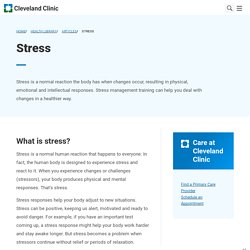
Stress is the body's reaction to any change that requires an adjustment or response. The body reacts to these changes with physical, mental, and emotional responses. Stress is a normal part of life. You can experience stress from your environment, your body, and your thoughts. Even positive life changes such as a promotion, a mortgage, or the birth of a child produce stress. Cleveland Clinic is a non-profit academic medical center. How does stress affect health? The human body is designed to experience stress and react to it. Stress that continues without relief can lead to a condition called distress – a negative stress reaction. Stress: Why does it happen and how can we manage it?
Stress is a natural feeling of not being able to cope with specific demands and events. However, stress can become a chronic condition if a person does not take steps to manage it. 5 Things You Should Know About Stress. Emotional Distress Can Speed Up Cellular Aging. A wide range of studies has shown that the stress caused by things like untreated depression, social isolation, long-term unemployment, and anxiety attacks can speed-up the aging process by shortening the length of each DNA strand.
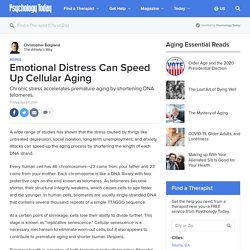
Every human cell has 46 chromosomes—23 come from your father and 23 come from your mother. Each chromosome is like a DNA library with two protective caps on the end known as telomeres. As telomeres become shorter, their structural integrity weakens, which causes cells to age faster and die younger. In human cells, telomeres are usually single-stranded DNA that contains several thousand repeats of a simple TTAGGG sequence. article continues after advertisement At a certain point of shrinkage, cells lose their ability to divide further.
Nine Ways Stress is More Dangerous Than You Think. High-pressure workdays, long commutes, raising kids, not enough sleep or exercise, trying to make ends meet.

The accumulated stresses of everyday life can damage your health in irreversible ways — from early aging to heart problems to long-term disability. Some people believe stress makes them perform better. But that’s rarely true. Research consistently shows the opposite — that stress usually causes a person to make more mistakes. Besides making you forget where you put your keys, stress also can have dramatic negative impacts on your health. How stress affects your brain - Madhumita Murgia. Perceived Stressful Situations and Coping Strategies Utilized by the Elderly: Journal of Community Health Nursing: Vol 4, No 2. Proposed working definition of an older person in Africa for the MDS Project. Singapore To Increase Retirement, Re-employment Ages. It is high time for a Ministry on Ageing Issues. SINGAPORE: Recently, Institute of Policy Studies senior research fellow Faizal Yahya proposed that in view of the incidence of ageism and the emerging challenges posed by technological disruptions, resulting in the displacement of many older workers, a new Ministry of Ageing, coordinating closely with the Manpower and Education Ministries, should be set up.

Indeed, the time is ripe for the creation of such a Ministry. Today, the life expectancy in Singapore has risen to 84.79 years, from 76.1 years in 1990. By 2030, one in four Singaporeans will be aged 65 and above. Singapore’s workforce will age rapidly. The median age is expected to rise from 40.6 in 2010 to 53.7 in 2050. Stress in the Elderly. Perceived Social Support Hassles and Coping Among. The Functionalist Perspective on Aging. Disengagement Theory The disengagement theory of aging claims that it is natural and acceptable for older adults to withdraw from society and personal relationships as they age.
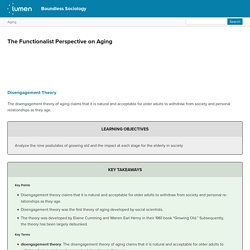
Learning Objectives Analyze the nine postulates of growing old and the impact at each stage for the elderly in society Key Takeaways Key Points Disengagement theory claims that it is natural and acceptable for older adults to withdraw from society and personal relationships as they age.Disengagement theory was the first theory of aging developed by social scientists.The theory was developed by Elaine Cumming and Warren Earl Henry in their 1961 book “Growing Old.” Key Terms disengagement theory: The disengagement theory of aging claims that it is natural and acceptable for older adults to withdraw from society and personal relationships as they age.activity theory: Activity theory claims that staying mentally and physically active preserves older adults happier.Robert J.
Elderly Population in Singapore: Understanding Social, Physical and Financial Needs. How stress affects seniors, and how to manage it. Exercise, breathing techniques, and medication can help you manage stress as you get older.
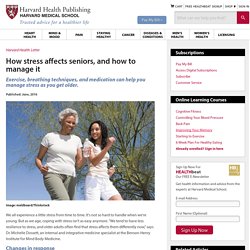
Image: moldboard/Thinkstock We all experience a little stress from time to time. It's not so hard to handle when we're young. But as we age, coping with stress isn't as easy anymore. Stress on health-related quality of life in older adults: the protective nature of mindfulness. Mental health of older adults. Older adults, those aged 60 or above, make important contributions to society as family members, volunteers and as active participants in the workforce.
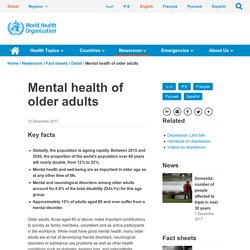
While most have good mental health, many older adults are at risk of developing mental disorders, neurological disorders or substance use problems as well as other health conditions such as diabetes, hearing loss, and osteoarthritis. Furthermore, as people age, they are more likely to experience several conditions at the same time. The problem. Number of elderly suicides at all-time high: SOS.
SINGAPORE: When Madam Tan (not her real name), a widow in her 90s, suddenly lost her son to a heart attack, she thought all hope was lost.
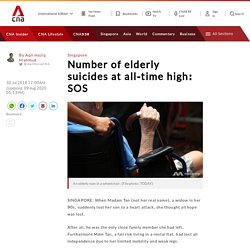
After all, he was the only close family member she had left. Furthermore Mdm Tan, a fall risk living in a rental flat, had lost all independence due to her limited mobility and weak legs. "Our care management team knew of her suicidal thoughts," senior social worker at Tsao Foundation's Hua Mei Mobile Clinic Jasmine Wong told Channel NewsAsia. Elderly suicide: How to address the rising trend in Asia’s ageing population? Asia is ageing at an unprecedented pace and the region is on track to have the oldest population in the world in the next few decades.

According to the United Nations, a quarter of Asia’s population — about 1.3 billion people — will be over 60 by 2050. The larger proportion of senior citizens is the result of increased longevity and declining fertility. The Impact of Activity Interventions on the Well-Being of Older Adults in Continuing Care Communities. Definition of the Disengagement Theory of Aging. Zambianchi Manuela Tesi Dottorato XXVI ciclo.
Proactive coping and preventive coping: Evidence for two distinct constructs? 40 Healthy Coping Skills That Will Help You Feel Better. Whether you’ve been dumped by your date or you’ve had a rough day at the office, having healthy coping skills can be key to getting through tough times.
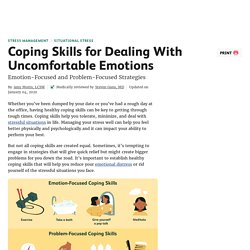
Coping skills help you tolerate, minimize, and deal with stressful situations in life. Managing your stress well can help you feel better physically and psychologically and it can impact your ability to perform your best. But not all coping skills are created equal. Sometimes, it’s tempting to engage in strategies that will give quick relief but might create bigger problems for you down the road. It’s important to establish healthy coping skills that will help you reduce your emotional distress or rid yourself of the stressful situations you face. Problem-Based Coping vs. OLDER ADULTS’ COPING WITH NEGATIVE LIFE EVENTS: COMMON PROCESSES OF MANAGING HEALTH, INTERPERSONAL, AND FINANCIAL/WORK STRESSORS. En a10v43n4. Aldwin1991.